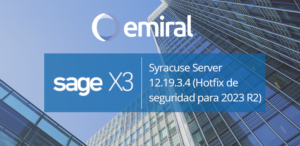There are barely two months left for the new version 1.1 to come into operation. of Immediate Supply of Information (SII) and so that companies that are required to file VAT through this system update their ERP management software. Specifically, as of January 1, 2021, the new version of SII 1.1. will include new validations and errors. The objective with these novelties, according to the Tax Agency, is to improve the quality of the information provided and make the procedures even more efficient.
The communication about these new validations was issued on June 30, 2020, and although the tests began last October, it is not until January 1 of the next year when they will come into operation. It is important to be aware of these developments because they require the update of the accounting modules of the companies.
The validations that are presented below are three accounting books: the record book of issued invoices (LRFE); the record book of invoices received (LRFR) and the record book of certain intra-community operations (sale of goods on consignment, LRDOI).
Índice de contenidos
New validations in the record book of invoices issued
Next, we expose the new validations in the record book of issued invoices.
Refund for travelers
- In communication types A4, A5 or A6, the block called Provision of services cannot be completed.
- When the communication type is A4, the issue date cannot be later than 12.31.2018.
- When the type of communication is A4, the date of operation will be mandatory and after the date of issue.
Total
- If the total amount field is filled in, it will be validated that it is equal to: Ʃ (BI + Charged fee + Equiv. surcharge fee) of all the detail lines of the Subject/Non-exempt block + Ʃ (BI exempt) of all the detail lines of the block “Subject/exempt” + “Amount not subject to art 7, 14, others” + “Amount not subject by location rules”.
- An error of ± 10 euros will be accepted.
- If not met, error message.
- It will not apply when the scheme key is 03,05,06 or 09.
- It will not apply when there has been a billing agreement
Simplified invoices
- Breakdown of fee passed on:
- When the type of invoice is F2, F4 or F5, the fee charged field must be equal to the tax base for the type (a margin of ± 10 euros will be allowed).
- Amount not exceeding 3,000 euros (Art. 4.2 Billing Regulations):
- When the type of invoice is F2 Ʃ (BI + Quota) of all the detail lines of the Subject/Not exempt block + Ʃ (BI exempt) of all the detail lines of the "Subject/Exempt" block + "Amount not subject art 7, 14, others” + “Amount not subject to location rules” may not exceed 3,000 euros (a margin of ± 10 euros will be accepted).
Insolvency proceedings and totally or partially uncollectible credits
- When the type of invoice is R2 or R3, the following will be validated:
- Breakdown: Breakdown will only be allowed at the invoice level and the counterparty must be identified by NIF.
Counterparty identification block (I)
- If the type of invoice is F2, F4 and R5, the counterparty identification block cannot be completed. Otherwise, the registration will be rejected.
- If the transmission amount subject to VAT is filled in, the type of invoice must be F1, F3, R1, R2, R3 and R4.
Counterparty identification block (II)
- Intra-community deliveries of goods. Identification of the counterparty.
- When the counterparty is identified through the `IDOtros` block and the type of identification is 02, it will be validated that the identifier field conforms to the VAT NIF structure of one of the EMs.
- When the counterparty is identified through the `IDOtros` block and the type of identification is 02, it will be validated that the type of invoice is F1, R1, R2, R3 or R4.
Counterparty identification block (III)
- Inversion of the passive subject (S2 and S3). Identification of the counterparty.
- When S2 or S3 is indicated, the counterparty must be identified by NIF.
- When S2 is indicated, the type of invoice can only be F1, R1, R2, R3 and R4.
- When S3 is indicated, the type of invoice can only be F1, R1, R2, R3 and R4.
Counterparty identification block (IV)
- Equivalence surcharge.
- When the `quota surcharge of equivalence´ field is filled in, the counterparty must be identified by NIF and must be valid. (In particular, 07 not included in the census will not be admitted).
Issue date and settlement period
- The date of issue may not be prior to the date of operation. This validation will not apply when any of the special regime keys is 14 or 15 or communication type A4.
- The fiscal year and period must coincide with the fiscal year and period of the transaction date. This validation will not apply if the type of invoice is R1, R2, R3, R5 or in the case of negative R4. Nor will it apply to F1 invoices that are issued for the rectification of invoices by substitution, option 2 of FAQ 2.8.
- In the absence of a transaction date, the fiscal year and the period must coincide with the fiscal year and the period of the issue date. This validation will not apply if the type of invoice is R1, R2, R3, R5 or in the case of negative R4.
Special regime for used goods
- When only one special regime is marked and it is 03, the 'not subject' block cannot be completed.
- When only one special regime is marked and this is 03, within the 'Subject/Not exempt' block, only S1 can be indicated.
Special gold investment regime
- When the special regime code is 04, the `not subject' block cannot be completed.
- When the special regime code is 04, it cannot be indicated.
- S1 or S3 of the 'subject/not exempt' block.
Special regime group of entities
- The 'tax base at cost' field cannot be filled in if none of the system keys is 06.
- If any of the scheme codes is 06, the type of invoice must be different from F2, F3, F4, R5.
Special cash criterion regime
- When only a special regime is marked and it is equal to 07, the non-subject block cannot be completed.
- When only one special regime is marked and it is equal to 07, neither S2 nor S3 of the Subject/non-exempt block can be indicated.
- When only a special regime is marked and it is equal to 07, the exemption codes E2, E3, E4 and E5 of the exempt block cannot be used.
Operations subject to IGIC/IPSI
- When a special regime key is indicated and it is equal to 08, only the 'not subject' block may be completed by location rules.
Charges by third parties
- When regime code is 10, the type of invoice must be F1.
- When the system key is 10, the counterparty must be identified by NIF. (In particular, code 07- Not registered will be rejected).
- When the system key is 10, only the block 'not subject to art 7, 14' can be completed.
local business leasing
- When a single regime is indicated and it is 11, 12 or 13, only the Type of 21% will be admitted.
VAT pending accrual AAPP
- When a single regime is marked and it is 14, the counterparty must be identified by NIF that begins with P, Q, S or V.
- When a single scheme is marked and it is 14, the type of invoice must be F1, R1, R2, R3 or R4.
- When a single regimen is marked and it is 14, the date of operation will be obligatory and subsequent to the date of issue.
- When a single regime is marked and it is 14, the exempt block cannot be completed.
Invoices prior to inclusion in the SII
- First semester of 2017 and invoices prior to inclusion in the SII. Key 16.
- Key 16 cannot be used if the taxpayer is included in the SII for the indicated period.
Subject/non-exempt block (I)
- Equivalence surcharge
- If the tax rate is 21 %, only 5.2 or 1.75 will be accepted as surcharge rate.
- If the tax rate is 10 %, only 1.4 will be accepted as a surcharge rate.
- If the tax rate is 4 %, only 0.5 will be accepted as a surcharge rate. Otherwise, rejection message.
Subject/non-exempt block (II)
- Reversal of the passive subject. S2 and S3.
- S2 or S3 can only be indicated when any of the special regime codes is 01, 04, 05, 06, 07 or 12.
Exempt Block (I)
- Exemption codes E2 and E3.
- If only one special regime code is marked and it is equal to 01, exemption codes E2, E3 cannot be used.
Exempt Block (II)
- Intra-community deliveries. Exemption code E5.
- The E5 exemption key cannot be used within the 'provision of services' block.
- When E5 is indicated, the counterparty must be identified through the 'IDOthers' block with identification type 02.
New validations Record book of invoices received
Total
- If the 'total amount' field is filled in, it will be validated that it is equal to: Ʃ (BI + Supported fee + Equal surcharge fee + Compensation amount) of all the detail lines of the 'Breakdown' block + Ʃ (BI + Supported fee + Surcharge fee eq. of all the detail lines of the block 'Detailed investment of the passive subject'.
- A margin of error of +/- 10 euros will be accepted.
- If not met, error message.
- Will not apply if regime key is 03,05,06.
Simplified invoices
- When the type of invoice is F2 or R5, the 'total amount' field cannot exceed 3,000. ( + 10 euros margin of error will be accepted).
- When the type of invoice is F2 or R5 and the total amount field is not filled in, Ʃ (BI + Quota supported) of all the detail lines cannot exceed 3,000. ( + 10 euros margin of error will be accepted).
- When the type of invoice is F4, the sum of the 'tax base' field cannot exceed 6,000. ( + 10 euros margin of error will be accepted).
Issue date and settlement period
- The issue date cannot be later than the system date.
- The settlement period cannot be prior to the period corresponding to the date of issue.
Agricultural offsets
- When the system key is 02, the counterparty must be identified by NIF.
- When the scheme key is 02, the 'compensation amount' field must be filled in.
Special regime group of entities
- The base field taxable at cost cannot be filled in if none of the system keys is 06.
- If any of the system codes is 06, the type of invoice can only be F1, R1, R2, R3 or R4.
Special cash criterion regime
- If there is only one system key and it is 07, the block 'Detailed investment of the taxpayer' cannot be completed.
IGIC/IPSI
- When only one system key is marked and it is 08, the block 'Detailed investment of the taxpayer' cannot be completed.
- When only one scheme key is marked and it is 08, within the 'breakdown' block only the taxable base field can be filled in.
- When only one scheme key is marked and it is 08, the 'Deductible fee' field must be 0.
Intra-community acquisitions of goods
- When the code for the special regime is 09, the 'Detailed taxpayer investment breakdown' block cannot be completed.
- When the special regime code is 09, the type of invoice can only be F1, R1, R2, R3, R4.
- When the key for the special regime is 09, the counterparty must be identified with NIF-VAT. (ID type can only be 02).
- When the special regime code is 09, it will be validated that the 'identifier' field conforms to the structure of the NIF-VAT of any of the MS.
Invoices prior to inclusion in the SII
- Key 14 cannot be used if for the period (first half of 2017 and invoices prior to inclusion in the SII. Key 14) the taxpayer is included in the SII.
imports
- When the type of invoice is F5 or LC, the regime code can only be 01, 04, 05 or 08.
- When the type of invoice is F5 or LC, the block 'Detailed investment of the taxpayer' cannot be completed.
deductible fee
- If the field 'equivalent surcharge fee' is completed, the 'deductible fee' field must be zero.
- If the type of identification is 03, 04, 05 or 06, the 'deductible quota' field can only be 0. It will not be applied if the 'investment breakdown of taxpayer' block is filled in.
investment property
- Optional completion.
- If scheme key = 02, investment asset cannot be 'YES'.
- If there is only one scheme key and it is 08, investment property cannot be 'SI'.
Deduction in later period
- New field “deduct in subsequent period”.
- If the 'deduction exercise' and 'deduction period' fields are filled in, the 'deduct in subsequent period' field must be 'Yes'.
Deduction and deduction exercise
- New fields "exercise" and "deduction period".
New validations Record book of certain intra-community operations (goods in consignment)
Goods in consignment. Headline
- Mandatory completion block.
- The NIF associated with the owner of the book must be identified.
- The NIF of the representative of the record book holder, if included, must be identified.
- If the NIF of the Holder of the Registry Book is of a minor (begins with K) the field 'Representative NIF' is mandatory and different from the NIF of the holder.
Goods in consignment. Declared record ID block
- Mandatory completion block.
- It consists of three fields: Exercise, Period and IdRegistro.
- The 'IdRegistro' field is the number assigned by the taxpayer to each record sent. You must uniquely identify each record. (Ex: 2020-01, 2020-02, 2020-03)
- XX-XXXX ≥ 03-2020. (Effective date of consignment sales. Operations related to shipments/receptions of 2020 could be registered in 2021).
Goods in consignment. counterparty block
- Compulsory completion block if Type of operation = 01 or 09.
- Unfilled block if Type of operation ≠ 01 or 09.
- Only identification through NIF-VAT will be allowed.
- It will be validated that the identifier field conforms to the NIF-VAT structure of any of the EMs.
Goods in consignment. Initial recipient surrogate block
- Mandatory block if the type of operation= 02.
- Unfilled block if the type of operation ≠ 02.
- Only identification through NIF-VAT will be allowed.
- It will be validated that the identifier field conforms to the NIF-VAT structure of any of the EMs.
Goods in consignment. deposit block
- Mandatory block If the type of operation=01.
- If the depository block is completed, it must be different from the one identified in the Counterpart block. (only NIF-VAT)
- If the type of operation=01, the Warehouse Address field must be filled in. Otherwise rejection message.
Goods in consignment. Shipping / receiving information block
- Mandatory block if the type of operation= 01 or 02 or 09.
- If the type of operation=01: all the fields of the information block shipment reception are mandatory, except the replacement date field.
- If the type of operation=02, only the description, quantity and substitution date fields are mandatory.
- If the type of operation=09, only the description and quantity fields are mandatory.
- The substitution date field cannot be filled in if the operation key is different from 02. Otherwise, a rejection message.
Consignment goods. Initial RegistrationID Block
- Mandatory if the type of operation ≠ 01 or 09.
- It will be validated that IdRegistroExpInicial coincides with some IdRegistroDeclarado of the owner already existing in the system.
Goods in consignment. final destination block
- Mandatory block if Type of operation≠ 01 or 02 or 09.
- Description: required if Type of operation ≠ 01 or 02 or 09.
- Quantity: mandatory if Type of operation≠ 01 or 02 or 09.
- Operation date: mandatory if Type of operation≠ 01 or 02 or 09.
- Final recipient block: mandatory if Type of operation= 03 or 04. (only NIF-VAT will be accepted).
- BI/Value: Required if Operation Type≠ 01 or 02 or 09.
- Unit price: mandatory if Type of operation≠ 01 or 02 or 07 or 09.
Goods in consignment. Billing Agreement and Succeeding Entity
- Billing Agreement Registration.
- The registration number must exist.
- succeeded entity.
- The NIF must be identified.
If you are still not familiar with this VAT registration bookkeeping system, we will resolve the main doubts that may arise.
What is IBS?
The Immediate Supply of Information (SII) It is a system implemented by the Tax Agency with the aim of modernizing and promoting electronic means in matters of VAT taxation. In this way, it is also about preventing tax fraud since the Tax Agency will obtain transaction information almost in real time.
The SII consists of the electronic supply of billing records (issued and received), which are part of the VAT Registry Books. To do this, the AEAT must be sent the details of billing electronically (through web services based on the exchange of XML messages, or where appropriate, through the use of a web form), with whose information they will be configured, practically in real time, the different Registry Books.
This tax obligation implies the electronic keeping of the following books:
- Record Book of Issued Invoices.
- Record Book of Invoices Received.
- Record Book of investment goods.
- Record Book of Intra-Community Transactions.
- Record Book of Cash Amounts.
Who is required to have this electronic VAT management system?
Since July 1, 2017, this VAT management system is mandatory for companies whose turnover exceeds 6 million euros; are registered in the REDEME (Registry of Monthly VAT Refund) or are covered by the Special Regime for VAT Groups (REGE). The communities of Navarra, Bizkaia, Guipúzcoa and Álava joined this regulation at the beginning of 2018.
In addition to those that are required, any company can voluntarily join this new system to improve communication on this matter with the Tax Agency. At the end of the year, this group can resign from this system.
What is the billing registration procedure
The companies obliged to present the registry books through the electronic headquarters of the AEAT must send the detail of the invoices issued and received after each invoicing.
Specifically, the information regarding the invoices issued must be sent to the AEAT within four working days; and always before the 16th of the following month.
On the other hand, received invoices must be sent within 4 business days following the date on which the accounting record is made, and as occurs with issued invoices, before the 16th of the following month.
How we can help you with our solutions
At Emiral we have extensive experience in implementing solutions to carry out the procedures required by the Tax Agency. And we are ready to implement the new validations in the Immediate Supply of Information (SII), always in a personalized way and guaranteeing maximum data protection.
Our team of experts in administrative processes and tax filing adapt the right solution to the volume of information required by each business. In this way, we guarantee that our clients adapt their billing to the new regulations, in a simple, fast and centralized way.
One aspect to highlight is the guaranteed confidentiality of the information, so that communications with the AEAT are made through HTTPS certificates and certificates.
This is how we implement our custom solution in three steps; so that the companies that are obliged, or those that have voluntarily accepted this electronic procedure, can quickly and safely carry out the procedures required by the Spanish Tax Agency and by the Gipuzkoa Provincial Council.
Font: Tax agency
Do you want to implement an ERP in your company?
We help you!
In Emiral We know how much your company is worth, whether it is small, medium or large. For this reason, we want to offer you the best ERP management solutions so that your business continues to grow.







